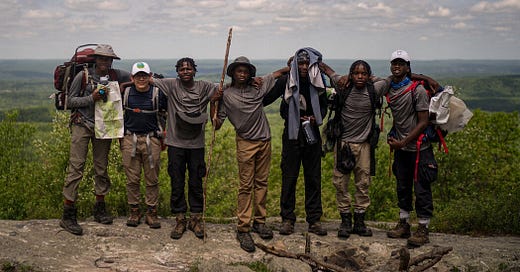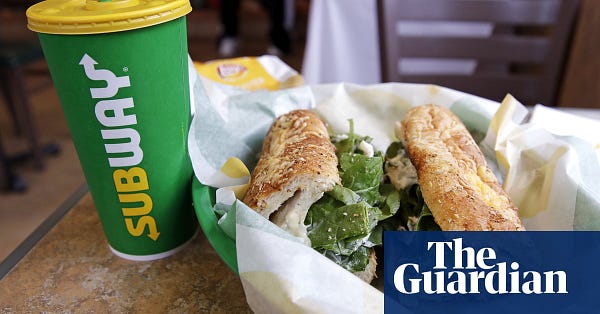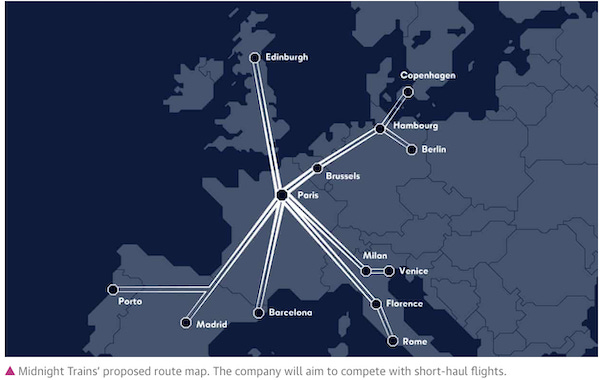Announcement: Summer Online Course
I frequently receive — and always appreciate — a particular comment about this newsletter and my goal to help you save time and stay smarter:
Readers would like the chance to go deeper — to gain more context, ask questions, debate ideas, and hear directly from key players in the news.
I’m very excited to announce a new opportunity — an experiment — to connect not only these ideas, but also the CRN community: A summer online course.
For 5 consecutive Thursdays this summer via Zoom, we’ll review selected key stories in our 5 categories — World, Economy, Technology, Smart Links & Good News — and go deeper, discussing why they matter today and what they might mean tomorrow. We’ll invite guest analysts in the various areas for additional in-depth understanding. Finally, we’ll open the floor and enable community members to discuss the ideas and issues.
The course starts July 8 and costs $100. You can learn more here.
As always, just email me with any thoughts or questions by replying to this newsletter. I’d love to hear from you.
Welcome to our weekend edition, a combination of the world, profiles, and good reads that you might not see during the week.
Subscriber benefit (today, 3 pm ET): What Happens Next, an extraordinary, invitation-only weekly call with academics and experts across economics, industry, medicine, history, literature, and more.
Today’s speakers include:
Luke Patey, Danish Institute for International Relations and Oxford Institute for Energy Studies: Why China faces Pushback
Hal Brands, Professor of Global Affairs at Johns Hopkins School of Advanced International Studies: U.S.-China, A Battle over Values
Tariq Shaukat, President of Bumble: Current State of Internet Dating and How COVID Changed Dating Patterns
Listen & Register: Newsletter subscribers can listen to today’s call here.
The World
President Biden reversed a stand he had taken forcefully just two days earlier, saying he will sign a roughly $1 trillion bipartisan infrastructure package even if he is unable to bring his party together for a separate bill that includes other Democratic spending priorities. On Thursday, Biden declared that he would sign the two bills together only. (Washington Post)
Scorching weather made Saturday the second hottest day in Seattle on record, as a heat dome settles in the Pacific Northwest and the region entered a prolonged period of extreme heat, with temperatures in the normally fair-weathered region set to soar over 100 degrees Fahrenheit. (Seattle Times, Washington Post)
Doctors and officials in the Russian cities of Moscow and St. Petersburg are now openly talking about a third wave of coronavirus infections. Tighter restrictions are being introduced in several regions of the country, vaccination is being made mandatory, and some hospitals are once again being equipped to exclusively handle COVID-19 patients. (Deutsche Welle)
Sydney and some surrounding areas will enter a hard two-week COVID-19 lockdown on Saturday as authorities struggle to control a fast-spreading outbreak of the highly infectious Delta variant. (Reuters)
Profiles & Reads
‘No Shortcuts?’: A 40-Mile Rite of Passage for High School Freshmen: A year after the pandemic canceled a nearly 50-year-old tradition, a New Jersey Catholic school brought back a mandatory hike across the Appalachian Trail. Each hiker learned a role — medic, navigator, cook, among others. If they couldn’t afford equipment or gear, they rented it from the school’s growing stockpile. Once in the woods, teachers fell back, leaving tenderfeet to find their way together. The boys surrendered their cellphones at the school, rode 50 miles on coach buses to the start of the trail, and strapped on backpacks that weighed 25 to 40 pounds. There was no turning back; anyone who started had to finish or do it all again, either in the summer or next spring.


Xi’s Gamble: The Race to Consolidate Power and Stave Off Disaster. Xi Jinping is a man on a mission. Why is he in such a rush? Most observers have settled on one of two diametrically opposite hypotheses. The first holds that Xi is driving a wide range of policy initiatives aimed at nothing less than the remaking of the global order on terms favorable to the CCP. The other view asserts that he is the anxious overseer of a creaky and outdated Leninist political system that is struggling to keep its grip on power. Both narratives contain elements of truth, but neither satisfactorily explains the source of Xi’s sense of urgency. A more accurate explanation is that Xi’s calculations are determined not by his aspirations or fears but by his timeline. Put simply, Xi has consolidated so much power and upset the status quo with such force because he sees a narrow window of ten to 15 years during which Beijing can take advantage of a set of important technological and geopolitical transformations, which will also help it overcome significant internal challenges. Xi sees the convergence of strong demographic headwinds, a structural economic slowdown, rapid advances in digital technologies, and a perceived shift in the global balance of power away from the U.S. as what he has called “profound changes unseen in a century,” demanding a bold set of immediate responses. (Foreign Affairs)


Inside Pfizer’s race to produce the world’s biggest supply of covid vaccine: Pfizer engineers used a ‘bulldozer’ approach to go from ‘utter failure’ to 3 billion doses. (Washington Post)


Why Are the Olympics Still Happening in Tokyo? These Numbers Explain It. The answer lies in billions of dollars, years of work and thousands of athletes who can’t wait any longer. (New York Times)
$15.4 billion: If Tokyo’s new national stadium stands empty on the night of the opening ceremony, that will be $15.4 billion in investment mostly down the drain.
$4 billion: That’s the potential television rights income the International Olympic Committee could have to refund if the Olympics are not held. The figure accounts for 73% of the I.O.C.’s revenue.
$1.25 billion: In March 2020, NBC Universal announced it had sold $1.25 billion in national advertising for the Olympics.
$549 million: The I.O.C. distributes $549 million in so-called solidarity and other payments to national Olympic committees large and small.
15,500: The postponement of the Olympics forced thousands of the athletes — about 11,100 for the Olympics and another 4,400 for the Paralympics, together representing more than 200 countries — to put their lives on hold for a year.
37%: That’s the current favorability rating for Japan’s prime minister, Yoshihide Suga, who may fear his political fortunes are tied too closely to the Games to cancel.


Why Humans Are So Thirsty: We stopped in front of what looked like a small tree but turned out to be a large vine. Julio told us Tsimane' use it when they are in the old-growth forest and need water. He began whacking at the vine from all sides with his machete, sending chips of bark flying with each stroke. Within two minutes he had cut off a meter-long section. Water started to pour out of it. He held it over his mouth, drinking from it for a few seconds to quench his thirst, then offered it to me. I put my water bottle under the vine and collected a cup. It tasted pretty good: light, a little chalky, almost carbonated. As part of my field research, I was asking Julio and other Tsimane' people how they obtain the drinking water they need in different places—in their homes, in the fields, on the river or in the forest. He told me only two types of vines are used for water; the rest don't work or make you sick. But when he pointed to those other vines, I could hardly tell a difference. The vines are a hidden source of water. Julio's observations raise a fundamental question of human adaptation: How did our evolutionary history shape the strategies we use to meet our water needs, particularly in environments without ready access to clean water? (Scientific American)


This story won the 2021 Pulitzer Prize and National Magazine Award for Feature Writing. It appeared in Issue 5, 2020 of Runner’s World.
Twelve Minutes and a Life: Ahmaud Arbery went out for a jog and was gunned down in the street. How running fails Black America. (Runner’s World)


The Big Tuna Sandwich Mystery: A lawsuit against America’s largest sandwich chain has raised questions about America’s most popular canned fish. We tried to answer one: Is Subway selling tuna? (New York Times)
Listen, Watch, Read
I’m introducing this new periodic feature to the Weekender — a recommended podcast, video & book. Let me know what you think (and send me your own suggestions) by replying to this email.
Listen: 50 Reasons to Love Joni Mitchell’s ‘Blue.’ The singer-songwriter questioned everything on her fourth album. 25 musicians speak about the LP’s enduring power on its 50th anniversary. (New York Times)


Watch & Read: Dr. Marcia Chatelain is Professor of History and African-American Studies at Georgetown University. Her most recent book, Franchise: The Golden Arches in Black America, won the Pulitzer Prize for History.
In February, Dr. Chatelain gave a lecture for Stanford’s Center for Deliberative Democracy: In the wake of the racial unrest of 1968, the federal government embarked on a series of social programs designed to respond to the cries of Black communities demanding an end to police brutality, access to quality housing, and economic investment in schools and jobs. Often, these cries were not fully heeded, and the marketplace became a terrain on which corporate America and the state argued that Black lives could be improved. In this presentation on her most recent book, Franchise: The Golden Arches in Black America, historian Marcia Chatelain links the rise of black capitalism with the fracturing of the mid-century civil rights struggle and eclipsing of Dr. Martin Luther King, Jr.’s dream of economic justice. In lieu of policies that could enhance the quality of life in America’s cities, many Black neighborhoods were offered fast food outlets, low-wage work, and an enmeshed relationship with corporate benevolence.
Good News
Their dog disappeared into the woods. Sixteen days later, Chunk was located — swimming in a Jersey bay. (Washington Post)


New network of European sleeper trains planned: French start-up aims to run ‘hotels on rails’ from Paris to 12 cities from 2024. (The Guardian)
Have a great Sunday! Subscribers support the creation of the newsletter, podcasts & live events.






